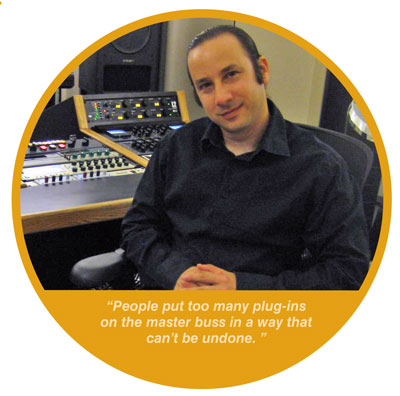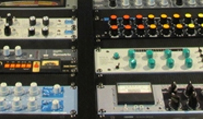MAOR APPELBAUM
Company: Maor Appelbaum Mastering
Clientele: Sepultura, Halford, Yngwie Malmsteen
Contact: http://maorappelbaum.com, 818-564-9276
Maor Appelbaum got his start with Sylvia Massy, producer and engineer of Tool’s Undertow. Ultimately he relocated to Los Angeles, CA, and launched his own studio. Today clients send him files from as far away as Europe and Asia. Although he has worked with a number of heavy/death metal bands, he doesn’t limit himself to any single genre and says he strives not to impress his own sound on a record.
Which mix problems can be addressed in the mastering stage? Which can’t?
I prefer to get a duller mix than a bright one. A duller mix I can brighten easily. You can create problems because high-end was added, but not in a balanced way. For example, you can have a mix with a lot of open cymbals but the vocals are dull. When I try to brighten the vocals, the cymbals become sizzled.
 What are the new challenges in mastering today?
What are the new challenges in mastering today?
People put too many plug-ins on the master buss in a way that can’t be undone. That limits what I can do and it takes away from the quality of the mix. If I get a mix with no buss compression, I have the option of adding it. But when it’s done in a mix and I ask them to take it off, it tears it apart.
How closely do you work with mix engineers?
In case the producer or mixer wants changes, I’ll accommodate them and make revisions. I like to extend communications so that each side is comfortable making suggestions. They appreciate me caring about a project and going the extra mile.
What’s the ideal format for mixes that you receive?
A stereo interleaved WAV file. Multi-mono is fine too. I usually recommend some headroom: between minus 3 and 6 dB peaking. There’s more chance that it will sound clear if there’s more headroom and less chance of clipping it. I recommend keeping it the same sample rate and bit-depth as the original mix session. To keep the fidelity, it is best not to down/up-sample or dither. But I’ve also successfully mastered projects that have been changed in these ways.
Do the online mastering forums offer good information
We’re dealing with technology, art and taste. Some people have a great experience with certain hardware or software. Other people have a horrible experience. You need to find what’s good for you. Just because a piece of gear is high quality doesn’t mean that it’s easy to use. And, you may not get the results you want quickly and that can make you not want to work with it.
Are there red flags that show a musician he might be working with a less than reputable mastering engineer?
It’s always about communication. You can work with a reputable mastering engineer and get a great result, but if a problem suddenly arises and he’s not willing to communicate with you, how can you deal with it? You can also work with someone who has less of a reputation and can bring you what you want. If there’s a problem and you can talk with him, you can find a solution.
What’s the biggest technical challenge/problem you’ve ever gotten out of?
Working on an album that has a lot of producers and/or mixers. In order to make such an album sound great, you have to find a way to compromise to achieve cohesiveness. You can’t make everything flow without making adjustments, and sometimes you have to take off something from a mix to accommodate the others.
What advice do you give to fledgling mastering engineers?
Understand the different genres and territories. When you do French rock, understand that it’s not like American rock; Swedish metal isn’t like American metal. Listen to all the styles and try to figure out how to accommodate each one.
Any final advice?
Experiment with different gear and see what you like. Not every piece is meant for every situation.













